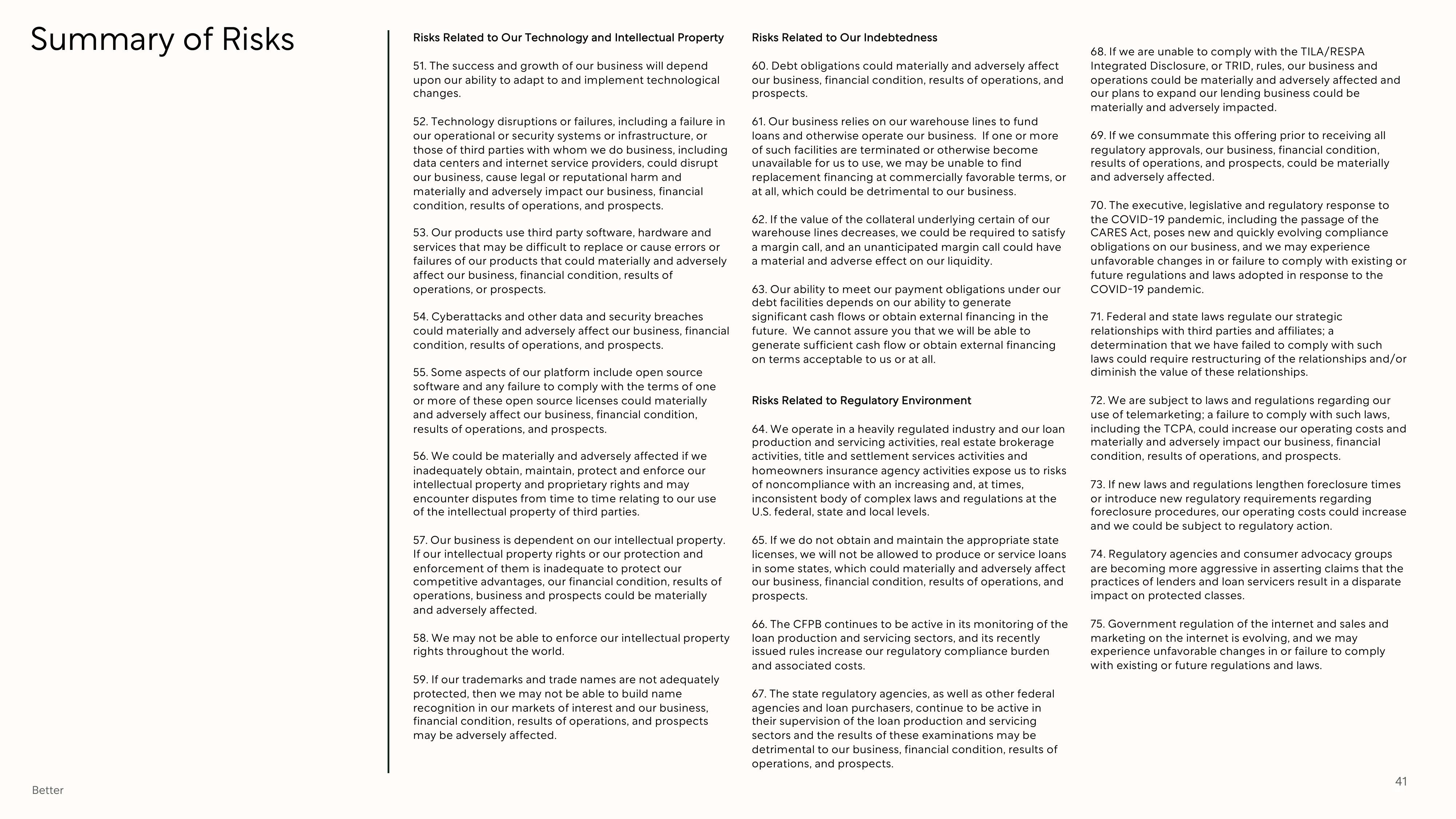Better SPAC Presentation Deck
Summary of Risks
Better
Risks Related to Our Technology and Intellectual Property
51. The success and growth of our business will depend
upon our ability to adapt to and implement technological
changes.
52. Technology disruptions or failures, including a failure in
our operational or security systems or infrastructure, or
those of third parties with whom we do business, including
data centers and internet service providers, could disrupt
our business, cause legal or reputational harm and
materially and adversely impact our business, financial
condition, results of operations, and prospects.
53. Our products use third party software, hardware and
services that may be difficult to replace or cause errors or
failures of our products that could materially and adversely
affect our business, financial condition, results of
operations, or prospects.
54. Cyberattacks and other data and security breaches
could materially and adversely affect our business, financial
condition, results of operations, and prospects.
55. Some aspects of our platform include open source
software and any failure to comply with the terms of one
or more of these open source licenses could materially
and adversely affect our business, financial condition,
results of operations, and prospects.
56. We could be materially and adversely affected if we
inadequately obtain, maintain, protect and enforce our
intellectual property and proprietary rights and may
encounter disputes from time to time relating to our use
of the intellectual property of third parties.
57. Our business is dependent on our intellectual property.
If our intellectual property rights or our protection and
enforcement of them is inadequate to protect our
competitive advantages, our financial condition, results of
operations, business and prospects could be materially
and adversely affected.
58. We may not be able to enforce our intellectual property
rights throughout the world.
59. If our trademarks and trade names are not adequately
protected, then we may not be able to build name
recognition in our markets of interest and our business,
financial condition, results of operations, and prospects
may be adversely affected.
Risks Related to Our Indebtedness
60. Debt obligations could materially and adversely affect
our business, financial condition, results of operations, and
prospects.
61. Our business relies on our warehouse lines to fund
loans and otherwise operate our business. If one or more
of such facilities are terminated or otherwise become
unavailable for us to use, we may be unable to find
replacement financing at commercially favorable terms, or
at all, which could be detrimental to our business.
62. If the value of the collateral underlying certain of our
warehouse lines decreases, we could be required to satisfy
a margin call, and an unanticipated margin call could have
a material and adverse effect on our liquidity.
63. Our ability to meet our payment obligations under our
debt facilities depends on our ability to generate
significant cash flows or obtain external financing in the
future. We cannot assure you that we will be able to
generate sufficient cash flow or obtain external financing
on terms acceptable to us or at all.
Risks Related to Regulatory Environment
64. We operate in a heavily regulated industry and our loan
production and servicing activities, real estate brokerage
activities, title and settlement services activities and
homeowners insurance agency activities expose us to risks
of noncompliance with an increasing and, at times,
inconsistent body of complex laws and regulations at the
U.S. federal, state and local levels.
65. If we do not obtain and maintain the appropriate state
licenses, we will not be allowed to produce or service loans
in some states, which could materially and adversely affect
our business, financial condition, results of operations, and
prospects.
66. The CFPB continues to be active in its monitoring of the
loan production and servicing sectors, and its recently
issued rules increase our regulatory compliance burden
and associated costs.
67. The state regulatory agencies, as well as other federal
agencies and loan purchasers, continue to be active in
their supervision of the loan production and servicing
sectors and the results of these examinations may be
detrimental to our business, financial condition, results of
operations, and prospects.
68. If we are unable to comply with the TILA/RESPA
Integrated Disclosure, or TRID, rules, our business and
operations could be materially and adversely affected and
our plans to expand our lending business could be
materially and adversely impacted.
69. If we consummate this offering prior to receiving all
regulatory approvals, our business, financial condition,
results of operations, and prospects, could be materially
and adversely affected.
70. The executive, legislative and regulatory response to
the COVID-19 pandemic, including the passage of the
CARES Act, poses new and quickly evolving compliance
obligations on our business, and we may experience
unfavorable changes in or failure to comply with existing or
future regulations and laws adopted in response to the
COVID-19 pandemic.
71. Federal and state laws regulate our strategic
relationships with third parties and affiliates; a
determination that we have failed to comply with such
laws could require restructuring of the relationships and/or
diminish the value of these relationships.
72. We are subject to laws and regulations regarding our
use of telemarketing; a failure to comply with such laws,
including the TCPA, could increase our operating costs and
materially and adversely impact our business, financial
condition, results of operations, and prospects.
73. If new laws and regulations lengthen foreclosure times
or introduce new regulatory requirements regarding
foreclosure procedures, our operating costs could increase
and we could be subject to regulatory action.
74. Regulatory agencies and consumer advocacy groups
are becoming more aggressive in asserting claims that the
practices of lenders and loan servicers result in a disparate
impact on protected classes.
75. Government regulation of the internet and sales and
marketing on the internet is evolving, and we may
experience unfavorable changes in or failure to comply
with existing or future regulations and laws.
41View entire presentation